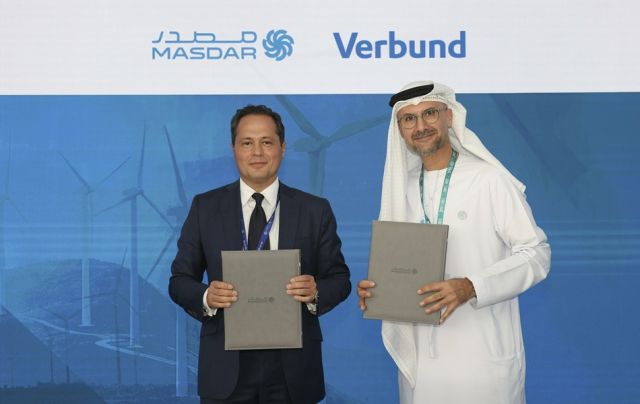
A joint venture agreement was signed by Mohammad Abdelqader El Ramahi, Masdar's Chief Green Hydrogen Officer and Hamead Ahrary, Managing Director of VERBUND Green Hydrogen GmbH during COP28 in Expo City Dubai (Source: Masdar)
Masdar and Verbund Green Hydrogen GmbH signed a deal to explore developing a green hydrogen plant in central Spain as part of efforts to decarbonize Europe's hard-to-abate sectors, the companies said on Dec. 7.
The agreement, announced at COP28, creates a 50-50 partnership for a joint study between Masdar, a United Arab Emirates power company and Austria’s Verbund AG, to explore the development of green hydrogen.
The companies will evaluate whether green hydrogen produced at the plant could displace up to 1 million tonnes of carbon emissions annually, which is the equivalent of removing around 700,000 cars from the road every year. The prospective plant will aim to generate green hydrogen to cover industrial demand in Spain and central Europe.
Spain currently consumes around 500,000 tonnes of gray hydrogen per year, which could be gradually replaced with green hydrogen. By 2035, Austria alone is expected to require around 600,000 tonnes per year of clean hydrogen.
“The Spanish market plays a vital role for us, both for the development of local H2 production, as well as for future potential import to central Europe,” Hamead Ahrary, managing director of Verbund Green Hydrogen GmbH said in a press release. “The joint study will generate valuable insights for the feasibility and execution of a potential project… Hence, we are looking forward to the results of this study."
The planned green hydrogen produced is expected to be used to decarbonize Spain, and more broadly Europe's, hard-to-abate sectors, which could include production of steel, fertilizers, chemicals, heavy transportation and aviation. Currently, steelmaking alone is responsible for 5% of European carbon emissions. With most EU nations pledging to become carbon neutral by 2050, green hydrogen presents a powerful vehicle for achieving that aim.
If found feasible by the study, the plant is expected to be operational by the end of the decade.
Recommended Reading
Hydrogen Hopefuls Advised to Focus on Offtake Amidst Funding Turbulence
2025-04-09 - Hydrogen is one way to reduce emissions when used in place of higher-emissions fossil fuel sources where feasible, but costs and infrastructure pose challenges.
Baker Hughes CEO: Expect ‘Volatility, Noise’ Around Energy Transition
2025-03-12 - Baker Hughes and Linde executives spoke about lower carbon resources such as hydrogen and geothermal, which will be part of the energy mix but unlikely to displace natural gas.
API’s Multi-Pronged Approach to Lower Carbon Operations
2025-01-28 - API has published nearly 100 standards addressing environmental performance and emissions reduction, which are constantly reviewed to support low carbon operations without compromising U.S. energy security.
Energy Transition in Motion (Week of March 14, 2025)
2025-03-14 - Here is a look at some of this week’s renewable energy news, including a record-breaking year for solar capacity additions.
CF Industries Form JV to Build $4B Low-Carbon Ammonia Project in Louisiana
2025-04-08 - CF Industries has reached a FID with JERA and Mitsui for an ammonia production facility in Louisiana. CF Industries sealed a deal with Occidental’s 1PointFive to capture and store CO2 from the facility.
Comments
Add new comment
This conversation is moderated according to Hart Energy community rules. Please read the rules before joining the discussion. If you’re experiencing any technical problems, please contact our customer care team.





